
Journal of Usability Studies
Scope & Guideline
Exploring the intersection of technology and user satisfaction.
Introduction
Aims and Scopes
- User Experience Research and Design:
The journal focuses on empirical research that informs the design of user experiences across various platforms, including web, mobile, and emerging technologies. This includes usability testing, user-centered design principles, and the application of heuristics. - Usability Measurement and Evaluation:
A core area of the journal is the development and application of usability metrics and evaluation tools, such as the System Usability Scale (SUS) and the User Experience Questionnaire (UEQ). This research aims to standardize usability assessments and improve the reliability of user feedback. - Interdisciplinary Approaches to Usability:
JUS encourages interdisciplinary research that integrates principles from psychology, design, computer science, and social sciences to enhance usability practices. This includes exploring cultural and contextual factors that influence user interactions. - Emerging Technologies and Usability:
The journal highlights the usability challenges and opportunities presented by emerging technologies, such as augmented reality (AR), voice interfaces, and autonomous systems. Research in this area focuses on adapting usability principles to new interactive paradigms. - Inclusivity and Accessibility in Design:
Research that emphasizes the importance of inclusive design practices and accessibility issues is a significant focus. This includes studies on usability for diverse populations, such as older adults and individuals with disabilities.
Trending and Emerging
- Integration of UX with Product-Market Fit:
Recent publications highlight the importance of aligning user experience design with product-market fit, emphasizing that understanding user needs is crucial for successful product development. This theme is becoming increasingly relevant in the context of competitive markets. - Trauma-Informed and Ethical Design:
There is a rising focus on trauma-informed design principles, particularly in social services and healthcare contexts. This emerging theme stresses the need for ethical considerations in design that prioritize user well-being and psychological safety. - Cross-Cultural UX Design Strategies:
As globalization increases, the need for cross-cultural UX design strategies is gaining prominence. Researchers are exploring how cultural differences impact user experience and how to design interfaces that are globally relevant yet locally adaptable. - Augmented Reality and New Media Interfaces:
The exploration of user experiences in augmented reality and other new media interfaces is on the rise. This trend reflects the growing importance of understanding how users interact with immersive technologies and the unique usability challenges they present. - Remote and Adaptive UX Research Methods:
The COVID-19 pandemic has accelerated the adoption of remote UX research methods, leading to an emerging body of work focused on adapting traditional usability practices for remote environments. This theme highlights the importance of flexibility and adaptability in UX research.
Declining or Waning
- Traditional Usability Testing Methods:
There has been a noticeable decline in the publication of studies focused solely on traditional usability testing methods. As the field evolves, researchers are increasingly integrating more innovative and dynamic approaches to usability assessment. - Single-Domain Usability Research:
Research that concentrates exclusively on usability within a single domain (e.g., e-commerce or educational platforms) is becoming less frequent. The trend is shifting towards more holistic studies that consider cross-domain usability principles and their applications. - Static Usability Guidelines:
The focus on static usability guidelines has waned as the field moves towards more flexible and context-sensitive design principles. Researchers are now more inclined to explore adaptive usability frameworks that respond to user needs in real-time.
Similar Journals

Human-centric Computing and Information Sciences
Championing Open Access for Global Knowledge ExchangeHuman-centric Computing and Information Sciences, published by the Korea Information Processing Society, represents a leading platform in the field of computer science, particularly focusing on the interaction between humans and computational systems. With an impressive Q1 ranking in the 2023 category of Computer Science (miscellaneous) and a commendable Scopus rank of #14/232 (94th percentile), this journal has established itself as a cornerstone for researchers and practitioners dedicated to advancing understanding in this vital area. Understanding the significance of making technology more accessible and effective for users, the journal has been an Open Access publication since 2011, promoting wide dissemination of knowledge without barriers. The journal's scope encompasses innovative methodologies, user experience design, and the integration of human factors into computing environments, making it essential reading for anyone interested in the intersection of technology and society. With all articles freely accessible, the journal not only contributes to scholarly discourse but also encourages collaboration among researchers worldwide, fostering further advancements in human-centric computing.
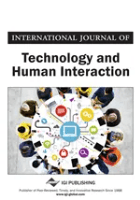
International Journal of Technology and Human Interaction
Transforming Perspectives on Technology's Role in Daily LifeInternational Journal of Technology and Human Interaction, published by IGI Global, serves as a critical platform for the exploration of the intersection between technology and human behavior, offering an interdisciplinary lens on topics within the realms of Human-Computer Interaction and Information Systems. With an ISSN of 1548-3908 and an E-ISSN of 1548-3916, this journal has been contributing to scholarly discourse since its inception in 2005, with ongoing publication until 2024. Hosting a diverse range of research articles, case studies, and reviews, the journal aims to advance the understanding of how technology influences human experience and interaction patterns in various contexts. Although currently positioned in the Q4 quartile of both Human-Computer Interaction and Information Systems categories, the journal fosters knowledge that aspires to redefine scope and standards within the field. Its commitment to quality research is reflected in its Scopus rankings, showcasing its relevance despite its emerging status in academia. Targeting researchers, professionals, and students alike, the International Journal of Technology and Human Interaction invites contributions that address the pressing challenges and innovations at the nexus of technology and human interaction.

Computers
Connecting Research and Technology for a Better TomorrowComputers is a leading journal published by MDPI, dedicated to advancing research in the fields of computer networks and communications, as well as human-computer interaction. Since its inception in 2012, it has established itself as a vital resource for scholars and practitioners, achieving an impressive Q2 ranking in Computer Networks and Communications and a Q3 ranking in Human-Computer Interaction as of 2023. The journal is indexed in Scopus, highlighting its relevance with a rank of #135/395 and #72/145 in their respective categories. Published in Switzerland, this open-access journal ensures widespread dissemination of research findings, supporting the global academic community in enhancing technologies relevant to computer science. Access options are available, fostering an environment where knowledge is shared freely. With an emphasis on innovation, redesign, and collaboration between humans and technology, Computers plays a crucial role in shaping the future of digital interactions.
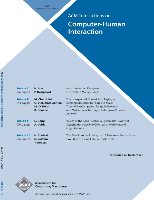
ACM Transactions on Computer-Human Interaction
Transforming User Engagement through Cutting-Edge StudiesACM Transactions on Computer-Human Interaction (ISSN: 1073-0516; E-ISSN: 1557-7325) is a prestigious journal published by the Association for Computing Machinery, focusing on the dynamic and rapidly evolving field of Human-Computer Interaction (HCI). With an impressive 2023 impact factor reflecting its high-quality research output, it proudly holds a Q1 ranking in the HCI category on Scopus, positioning it among the top journals in the field. Established in 1994, the journal has been a vital resource for researchers and professionals alike, featuring innovative studies that explore the design, evaluation, and implementation of user interfaces and interactive systems. Its broad scope encompasses various aspects of HCI, including cognitive processes, user experience design, and the social implications of technology. As an essential read for anyone involved in HCI research and practice, the journal is a gateway to advancements that shape the future of human-technology interactions. The journal is accessible to readers globally, and it plays a pivotal role in disseminating knowledge that drives excellence in software design and user interface research.
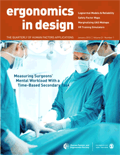
Ergonomics in Design
Empowering designers with cutting-edge ergonomic insights.Ergonomics in Design is a premier journal published by SAGE PUBLICATIONS INC that focuses on the intersection of engineering and human factors, offering essential insights into the practical applications of ergonomics. With an ISSN of 1064-8046 and E-ISSN of 2169-5083, this journal aims to disseminate high-quality research and innovative design solutions that enhance user experience across various domains. Having consistently ranked in the Q2 tier for Engineering and Q3 for Human Factors and Ergonomics, as per the recent Scopus Ranks, it serves as a valuable platform for scholars and practitioners dedicated to the advancement of ergonomic principles in design. The journal encompasses a wide array of topics from product design to workplace ergonomics, facilitating a multidisciplinary dialogue that supports the improvement of safety, comfort, and performance. This commitment to bridging theory and practice has established Ergonomics in Design as a vital resource for those keen to influence the design landscape from 1993 through to 2024 and beyond.

Multimodal Technologies and Interaction
Connecting Disciplines for Cutting-Edge Interaction.Multimodal Technologies and Interaction, published by MDPI since 2017, is an esteemed open-access journal based in Switzerland, dedicated to the exploration and advancement of innovative multimodal systems that enhance user experience across various digital platforms. With its commitment to disseminating high-quality research in diverse areas such as Computer Networks and Communications, Human-Computer Interaction, and Neuroscience, the journal has rapidly established itself within the academic community, achieving a commendable position in Scopus rankings including Q2 in both Computer Networks and Communications and Computer Science Applications. As an essential resource for researchers, professionals, and students alike, Multimodal Technologies and Interaction fosters interdisciplinary dialogue and supports the development of cutting-edge technologies, ensuring that advancements in multimodal interaction are accessible to a global audience. Scholars can benefit from its Open Access format, allowing unrestricted access to influential studies that shape the future of technology and interaction design.
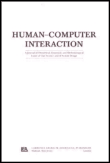
HUMAN-COMPUTER INTERACTION
Innovating the Way We Connect with ComputersHUMAN-COMPUTER INTERACTION is a premier academic journal published by Taylor & Francis Inc, dedicated to the interdisciplinary field of HCI, which explores the dynamic interactions between humans and computers. With its ISSN 0737-0024 and E-ISSN 1532-7051, the journal maintains a strong presence within the academic community and is recognized for its significant impact, holding a commendable impact factor that underscores its relevance. Ranked in the Q1 category for both Applied Psychology and Human-Computer Interaction, it occupies a critical position in Scopus rankings, listed as #15 in Applied Psychology and #11 in Computer Science, Human-Computer Interaction, placing it in the top 6% of relevant fields. Covering a broad spectrum of topics from usability studies to user experience design, the journal aims to facilitate innovative research and provide insights that bridge theoretical frameworks and practical applications. Published since 1985 and continuously evolving, HUMAN-COMPUTER INTERACTION remains an essential resource for researchers, professionals, and students eager to contribute to and benefit from advances in understanding how technology can effectively serve human needs.
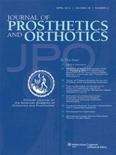
JOURNAL OF PROSTHETICS AND ORTHOTICS
Connecting Knowledge and Practice in Orthotic SolutionsJournal of Prosthetics and Orthotics is a prestigious peer-reviewed journal published by Lippincott Williams & Wilkins, dedicated to advancing the field of prosthetics and orthotics through high-quality research and innovative practices. With an ISSN of 1040-8800 and an E-ISSN of 1534-6331, this journal serves as a key resource for professionals, researchers, and students involved in biomedical engineering, orthopedics, and rehabilitation. With impactful contributions since its inception in 1982, the journal holds a significant reputation and ranks in the Q3 quartile across various categories, including Biomedical Engineering, Orthopedics and Sports Medicine, and Rehabilitation. It is committed to disseminating advancements in clinical practices, technological innovations, and educational methodologies. Although it operates under a subscription model, its wide-reaching influence makes it an essential reading for those dedicated to improving patient outcomes in prosthetics and orthotics.
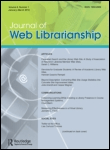
Journal of Web Librarianship
Fostering Collaboration between Libraries and TechnologyWelcome to the Journal of Web Librarianship, an esteemed publication dedicated to the evolving landscape of library science and information technology. Published by Routledge Journals, Taylor & Francis Ltd, this journal serves as a vital platform for researchers and professionals to share innovative practices, methodologies, and research findings in the fields of Library and Information Sciences and Computer Science Applications. With an impressive impact factor reflected in its 2023 rankings—Q1 in Library and Information Sciences and Q2 in Computer Science Applications—the journal is well-positioned to influence the discourse and development within these disciplines. Since its inception in 2007, the Journal of Web Librarianship has continually contributed to the academic dialogue, ensuring a comprehensive understanding of the critical role that web technologies play in library services. Though it is not an open-access journal, it remains an invaluable resource for those dedicated to advancing the practice and theory of web librarianship. Join us in exploring the intersections of information and technology as we work towards a more informed society.
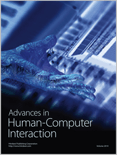
Advances in Human-Computer Interaction
Exploring the future of interaction.Advances in Human-Computer Interaction is a premier peer-reviewed journal published by HINDAWI LTD, dedicated to the exploration of cutting-edge research and innovation in the field of Human-Computer Interaction (HCI). With an ISSN of 1687-5893 and an E-ISSN of 1687-5907, this Open Access journal has been contributing to the scientific community since 2008, offering unrestricted access to critical findings and advancements. Based in Egypt with an address at ADAM HOUSE, 3RD FLR, 1 FITZROY SQ, LONDON W1T 5HF, ENGLAND, it occupies a notable position in the academic landscape, reflected in its 2023 Scopus ranking of Rank #57/145 and a 61st percentile in the Human-Computer Interaction category. As a Q3 journal, it plays a crucial role in disseminating research that bridges the gap between humans and technology, providing valuable insights for researchers, professionals, and students pursuing expertise in this dynamic field. The journal’s converged years from 2010 to 2024 signify its ongoing commitment to advancing knowledge and fostering collaboration among HCI experts worldwide.